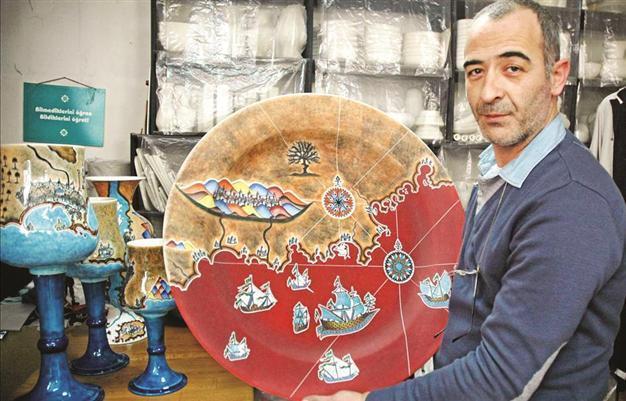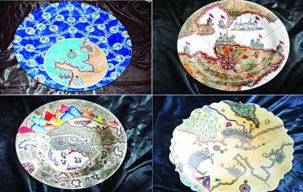Piri Reis map on tiles worth 1.5 million TL
KÜTAHYA - Anatolia News Agency

The collection, which was finished in 19 months by tile artist Fahri Çetinkaya, will be sold at auction in Istanbul with a starting price of 1.5 million Turkish Liras. AA photo
The famous world map of the Ottoman admiral Piri Reis has been transformed into 59 separate pieces of tile by an artist in the Aegean province of Kütahya, renowned for its tiles. The collection, which was finished in 19 months by tile artist Fahri Çetinkaya, will be sold at auction in Istanbul with a starting price of 1.5 million Turkish Liras.
Çetinkaya, 44, started working with tiles in 1982, under the auspices of his father-in-law İbrahim Kocaoğlu, known as Alopaşalı İbrahim, who is also a tile artist.

The artist said that creating tiles was a matter of the heart, adding, “I worked until the early hours of the morning without sleeping. I sometimes did not leave the workshop [and went] four or five days without seeing the sky.”
Çetinkaya said that the Ottoman admiral Piri Reis had finished the world map in just 29 days, an astoundingly short amount of time given the rudimentary tools available.
This year has been declared the Piri Reis Year by the United Nations Educational, Scientific and Cultural Organization (UNESCO), as it marks the 500th anniversary of the creation of the map. This came as a surprise to Çetinkaya. “When I started making the collection, nobody knew that this year would be declared the Piri Reis Year. It was declared 15 months after I started working on the map,” he said. “I made nearly 90 pieces of work in the collection but 59 out of these are directly related to the Piri Reis world maps. There are also maps of some parts of Europe and Asia as well as settlements on the Mediterranean coasts. None of the pieces are copies or similar to each other. I created my collection by including the settlement places and other Ottoman figures around when making the map. Therefore this collection was created with very great difficult in 19 months. Each piece is unique.”
The collection’s smallest pieces are 40-centimeter floor tiles. There are also jars, vases, candelabrum, bowls and quadruplet and twosome boards as well as plates ranging from 40 to 90 centimeters in diameter.
Collection in exhibitÇetinkaya said that all of the pieces were made up of complementary designs and figures, and showed the world map of Piri Reis as a whole. “I chose each of the tile forms one by one. The colors are the same, just like in the maps. I also carried out trials and research to make them more beautiful. As a result, it is a very nice collection. I tried to reflect what I felt on the tile.”
The collection will be exhibited from March 15 to May 31 at the Tophane-i Amire Culture Center of Istanbul’s Mimar Sinan University Fine Arts Faculty, as part of the Piri Reis Year events. An auction will also be held there for the sale of the collection, and the opening price for the 59-piece map tile collection will be 1.5 million liras.
Piri Reis map drawn in 1513
The Piri Reis map was drawn in 1513 by the Ottoman admiral and cartographer Piri Reis. The approximately one-third of the map that survives shows the western coasts of Europe and North Africa and the coast of Brazil with reasonable accuracy. Various Atlantic islands, including the Azores and Canary Islands, are depicted, as is the mythical island of Antillia and possibly Japan. The historical importance of the map lies in its demonstration of the extent of Ottoman exploration of the New World by approximately 1510.
The map was discovered accidentally in 1929 by German theologian Gustav Adolf Deissmann, who was commissioned by the Ministry of Education to catalogue the Topkapı Palace library’s non-Islamic items.

 The artist said that creating tiles was a matter of the heart, adding, “I worked until the early hours of the morning without sleeping. I sometimes did not leave the workshop [and went] four or five days without seeing the sky.”
The artist said that creating tiles was a matter of the heart, adding, “I worked until the early hours of the morning without sleeping. I sometimes did not leave the workshop [and went] four or five days without seeing the sky.”